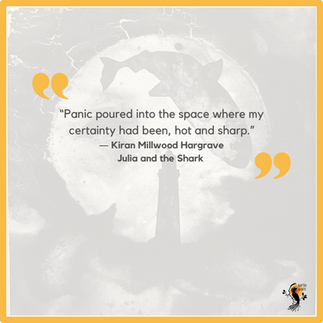Exploring the Impact of Mental Health on Family Dynamics: The Story of Julia and the Shark
- JoAnne Saldanha
- Oct 17, 2024
- 2 min read

“This is the story of the summer I lost my mum, and found a shark older than the trees. Don’t worry though, that doesn’t spoil the ending.”
Book review...
For the past week, I’ve been immersed in Julia and the Shark, a captivating and impactful read—both in its storyline and presentation. Kiran Millwood Hargrave’s lyrical writing tugged at my heart, often leaving me breathless. Tom de Freston’s mesmerizing, dramatic, and sometimes abstract illustrations fill the gaps, conveying tension, worry, and anguish that words alone cannot capture.
Julia and her parents leave their home in Cornwall to spend the summer at a remote lighthouse on the Shetland Islands. Her mathematician father is there for work, modernizing the lighthouse’s light, while her marine biologist mother hopes to study the elusive Greenland shark, believed to live nearby. Her mother’s obsession with the creature grows, driven by her desire to unlock secrets of human longevity—something deeply personal after losing her mother to early-onset dementia. As her search intensifies, it begins to unravel the family.

Julia befriends Kin, a South Asian boy whose family runs the island’s laundromat cum library. Kin teaches Julia about the stars, and together, they navigate local bullies. Yet, Julia cannot escape her mother’s struggle with mental health. “Mum sometimes bounced around like Tigger, and other times she was mopey like Eeyore,” Julia observes. After another rejected research grant pushes her mother to a crisis, Julia attempts to find the shark herself, believing it might help her mother heal.

Hargreaves uses the shark both as a literal creature and a metaphor for the fears and uncertainties Julia faces. The lighthouse, a constant beacon of hope, serves as a place where her father helps her make sense of their family’s turmoil. While the book’s central theme is coping with a parent’s mental health issues, it also explores bullying, diverse family dynamics, the environment, and astronomy. Note that the story touches on sensitive topics like overdose and attempted suicide.

Julia’s first-person narration makes the challenging themes real and relatable. The book opens the door to meaningful conversations but does so in a way that is gentle, wise, and comforting—offering reassurance to readers. One aspect I particularly loved is how the story subtly conveys that we all have stories, often overlooked when we’re too consumed by our own.
I picked up the hardbound edition after reading about its stunning design. Translucent pages reveal secret words and drawings hidden in the ocean's depths, while shadowy images of the shark lurk under the bed and against the wall, threatening to engulf Julia’s family.
Though Julia and the Shark is classified as a middle-grade novel, it’s a profound and beautiful read for adults as well.











Comments